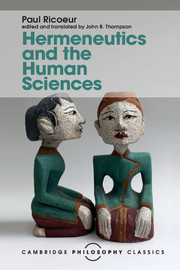Book contents
- Frontmatter
- Contents
- Preface to this edition
- Acknowledgements
- Editor's introduction
- Notes on editing and translating
- A response by Paul Ricoeur
- Part I Studies in the history of hermeneutics
- Part II Studies in the theory of interpretation
- 4 The hermeneutical function of distanciation
- 5 What is a text? Explanation and understanding
- 6 Metaphor and the central problem of hermeneutics
- 7 Appropriation
- Part III Studies in the philosophy of social science
- Select bibliography
- Index
5 - What is a text? Explanation and understanding
from Part II - Studies in the theory of interpretation
Published online by Cambridge University Press: 05 July 2016
- Frontmatter
- Contents
- Preface to this edition
- Acknowledgements
- Editor's introduction
- Notes on editing and translating
- A response by Paul Ricoeur
- Part I Studies in the history of hermeneutics
- Part II Studies in the theory of interpretation
- 4 The hermeneutical function of distanciation
- 5 What is a text? Explanation and understanding
- 6 Metaphor and the central problem of hermeneutics
- 7 Appropriation
- Part III Studies in the philosophy of social science
- Select bibliography
- Index
Summary
This essay will be devoted primarily to the debate between two fundamental attitudes which may be adopted in regard to a text. These two attitudes were summed up, in the period of Wilhelm Dilthey at the end of the last century, by the two words ‘explanation’ and ‘interpretation’. For Dilthey, ‘explanation’ referred to the model of intelligibility borrowed from the natural sciences and applied to the historical disciplines by positivist schools; ‘interpretation’, on the other hand, was a derivative form of understanding, which Dilthey regarded as the fundamental attitude of the human sciences and as that which could alone preserve the fundamental difference between these sciences and the sciences of nature. Here I propose to examine the fate of this opposition in the light of conflicts between contemporary schools. For the notion of explanation has since been displaced, so that it derives no longer from the natural sciences but from properly linguistic models. As regards the concept of interpretation, it has undergone profound transformations which distance it from the psychological notion of understanding, in Dilthey's sense of the word. It is this new position of the problem, perhaps less contradictory and more fecund, which I should like to explore. But before unfolding the new concepts of explanation and understanding, I should like to pause at a preliminary question which in fact dominates the whole of our investigation. The question is this: what is a text?
What is a text?
Let us say that a text is any discourse fixed by writing. According to this definition, fixation by writing is constitutive of the text itself. But what is fixed by writing? We have said: any discourse. Is this to say that discourse had to be pronounced initially in a physical or mental form? that all writing was initially, at least in a potential way, speaking? In short, what is the relation of the text to speech?
To begin with, we are tempted to say that all writing is added to some anterior speech. For if by speech [parole] we understand, with Ferdinand de Saussure, the realisation of language [langue] in an event of discourse, the production of an individual utterance by an individual speaker, then each text is in the same position as speech with respect to language.
- Type
- Chapter
- Information
- Hermeneutics and the Human SciencesEssays on Language, Action and Interpretation, pp. 107 - 126Publisher: Cambridge University PressPrint publication year: 2016
- 15
- Cited by



